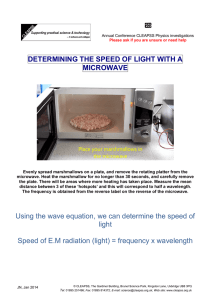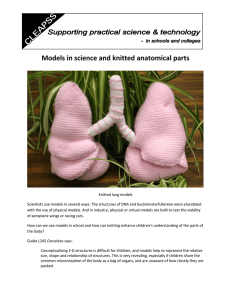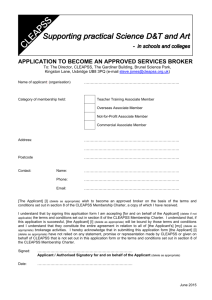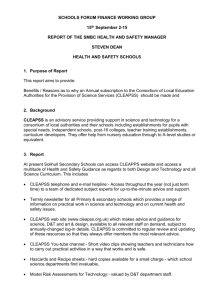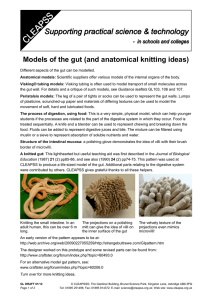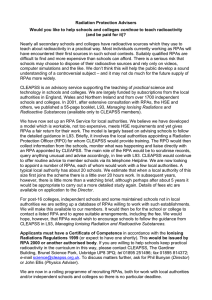A guide to CLEAPSS services 2014 - 15
advertisement
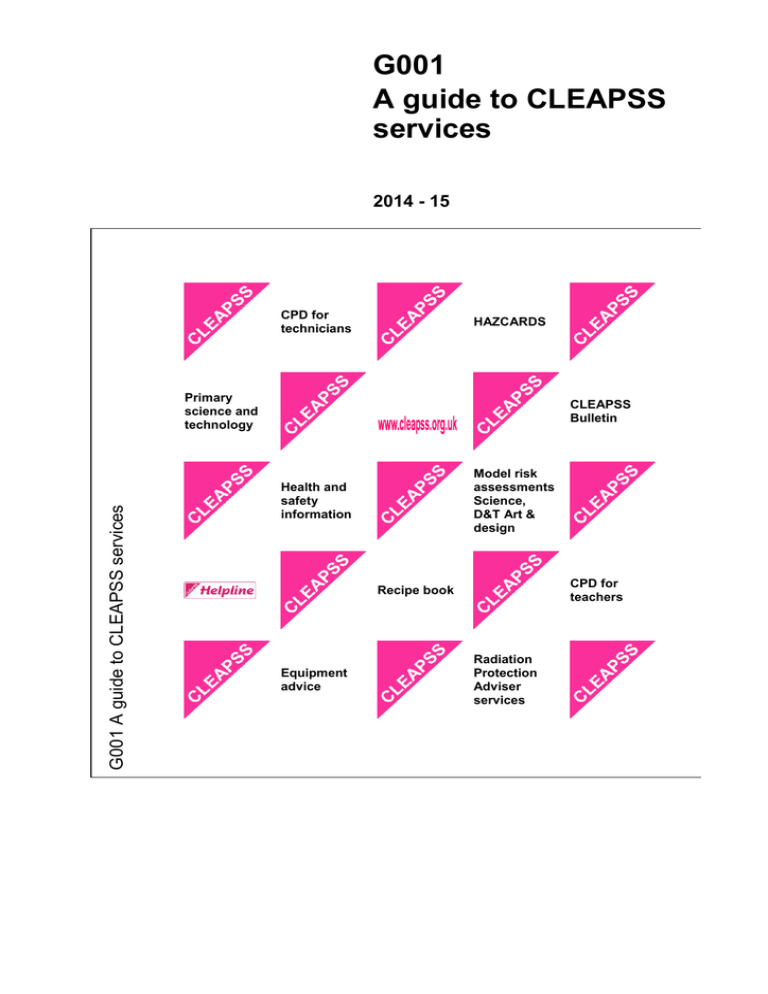
G001 A guide to CLEAPSS services 2014 - 15 CPD for technicians HAZCARDS G001 A guide to CLEAPSS services Primary science and technology CLEAPSS Bulletin Model risk assessments Science, D&T Art & design Health and safety information CPD for teachers Recipe book Equipment advice Radiation Protection Adviser services Supporting practical science, D&T and art - in schools and colleges The CLEAPSS mission statement CLEAPSS exists to support practical activities in science, D&T and art from early years to GCE A-level or equivalent, including health and safety, and advice on laboratories/workshops, equipment and resources Services are provided for:local authority officers, teachers, technicians, senior leaders and governors in schools and colleges in England Wales and Northern Ireland, Initial teacher educators. advisers, school suppliers, publishers, awarding bodies and other organisations involved in supporting or promoting practical science, D&T and art activities in schools and colleges CLEAPSS will:respond to queries quickly, courteously and accurately, keep abreast of developments in relevant areas and especially on health and safety matters, be proactive in drawing developments to the attention of members through publications and in-service training. This guide replaces all previous versions of G001 including L0i guides and will be updated yearly to adjust any changes in services and charges. CLEAPSS The Gardiner Building Brunel Science Park Kingston Lane Uxbridge UB8 3PQ © CLEAPSS® 2014 CLEAPSS and Hazcard(s) are registered trade marks 1 Tel: 01895 251496 Fax: e-mail: 01895 814372 science@cleapss.org.uk Web site: www.cleapss.org.uk G001 Guide to CLEAPSS services CONTENTS Page 1 2 Introduction ....................................................................................................................... 3 Purpose of CLEAPSS ....................................................................................................... 3 3 Membership and charges ................................................................................................. 3 4 5 The HELPLINE ................................................................................................................. 3 Publications ...................................................................................................................... 4 6 Review work ..................................................................................................................... 4 7 Courses, conference workshops and talks ........................................................................ 5 8 Consultancy, mercury monitoring & other site visits .......................................................... 5 9 Working with other organisations ...................................................................................... 6 10 11 Special risk assessments.................................................................................................. 6 RPA services .................................................................................................................... 6 Appendix i CLEAPSS charges………………………………………….…………………………......8 Appendix ii CLEAPSS courses ............................................................................................... 10 Appendix iii CLEAPSS staffing ................................................................................................. 12 2 G001 1 Guide to CLEAPSS Services Introduction The purpose of this guide is to assemble in one booklet information about CLEAPSS services likely to be useful to members. More information about CLEAPSS is available on our web site, www.cleapss.org.uk. 2 Purpose of CLEAPSS The aims and methods of working of CLEAPSS are defined by the Constitution, a copy of which is available in the membership section of our website. CLEAPSS works in the field of school and college science, D&T and art, from foundation stage through to GCE A-level or equivalent. It provides general support and advice for all aspects of practical work. This includes information, advice and training about laboratory and workshop design and working practices, technicians and their jobs, equipment, tools, materials, living organisms, and practical activities for students, with an over-arching focus on health and safety. CLEAPSS advice and guidance form the basis of model risk assessments for practical activities carried out in educational settings in science, D&T and art. CLEAPSS currently consists of twelve permanent staff plus a number of consultants (see appendix iii). We have an office and a laboratory/workshop on Brunel Science Park, on the campus of Brunel University. At the time of writing, all but two of the 182 authorities, with the duty to provide education, in England, Wales and Northern Ireland and the various islands, are members. (A sister organisation, SSERC, performs a similar function in Scotland.) Over 3000 Academies, incorporated colleges, independent, foundation and voluntary aided schools, teacher-training institutions, curriculum developers, field study centres and overseas establishments are associate members. CLEAPSS® is a registered trade mark. 3 Membership and charges 3.1 CLEAPSS Membership CLEAPSS membership is predominantly purchased by employers on behalf of their employees, to support the teaching of practical work in science, D&T and art including the provision of a costeffective way for the employer to discharge its duties under the 1974 Health &Safety at work act in these subject areas, namely to provide safety guidance and model risk assessments for any hazardous activities carried out by its employees. CLEAPSS members who do not have employees directly engaged in working in schools and colleges usually join CLEAPSS in order to ensure that their products and services are provided in a way that matches what is expected by employers in schools and colleges. 3.2 CLEAPSS Charges For a full list of CLEAPSS charges see Appendix i 4 The HELPLINE One of the key services provided by CLEAPSS is a Helpline service. CLEAPSS advisers respond to queries by telephone and e-mail (including via our web site) from teachers, technicians, senior leaders and local authority officers. We deal with around 7500 such queries per year. 3 The Helpline is staffed throughout term time and during holiday periods. Typically we take several dozen calls per day on health and safety, practical techniques, sources of equipment, laboratory design, etc. 5 CLEAPSS publications 5.1 Distribution of publications All of our current primary and secondary publications are available to members on the CLEAPSS web site, www.cleapss.org.uk 5.2 Newsletters Our termly newsletters for primary and secondary schools are distributed via member organisations internal mailing systems or are posted directly to associate members. These contain important H&S updates, highlight new services or publications and offer a vehicle to share useful ideas and experience from our members. Back copies of the newsletter are available on our website 5.3 Guides and leaflets All publications are now on our website. These cover everything from hatching chicks to managing radioactive sources and almost everything in between. Guidance covers Science, D&T (Food, Compliant materials, Resistant Materials, Construction) and Art. 5.4 Some specific publications Hazcards® A set of A5 index cards, covering chemicals used in school science up to and including GCSE and most of those used for A-level. Hazards, precautions, dealing with spills and other accidents, and immediate remedial measures are included. Hazcards can be used as the basis for model (general) risk assessments required by the COSHH Regulations 2002 and the Management Regulations 1999. Hazcards® is a registered trade mark. Note that due to changes in chemical hazard labelling Hazcards will be being updated over the next few years. Updated versions will appear first on the CLEAPSS website. Recipe sheets Intended to help laboratory technicians, this is a set of A4 sheets giving the compositions of common laboratory solutions and mixtures, and methods of preparing them. Safety information is given so they can be regarded as model (general) risk assessments for making up solutions. Model Risk Assessments for Design and Technology in Secondary Schools, covers both COSHH-type hazards (eg, chemicals, dusts) and those covered by the Management of Health and Safety at Work Regulations (eg, tools, machines). It is intended for design and technology teachers and technicians in secondary (and relevant special) schools. There are 5 sets of these model risk assessments covering: resistant materials, compliant materials; food technology, art, and construction. Student Safety Sheets Originally written in order to support the teaching of health and safety in the National Curriculum Programme of Study for Science, these are even more relevant to the new GCSEs and post-16 courses, including those for applied science. Student Safety Sheets are intended for pupils in Key Stage 4 and the sixth form, although some schools have used extracts with younger pupils. Student safety sheets can be accesses by pupils via the free publications section of our website without the need for a password. 4 6 Review work CLEAPSS provides a checking service for practical activities described in publications produced by other organisations such as publishers or awarding bodies. Comments and suggestion are provided on the safety of the activity and, where necessary, activities that are unlikely to work are identified. This service is available with and without the use of an endorsement from CLEAPSS and is charged on an hourly basis. For more information on this service and a copy of our terms and conditions please contact the Assistant Director, Matt Endean. 7 Courses, conference workshops and talks 7.1 Courses CLEAPSS runs a wide variety of courses, mostly 1-day, for local authorities, individual schools, and bodies such as academy groups and Science Learning Centres. These can be for primary or secondary teachers and technicians. A list of current course titles can be found in appendix ii. Full details of the content of courses and dates and venues can be found on the courses section of our website www.cleapss.org.uk. Courses are updated, altered or dropped and new ones added over time. We can also tailor a course to meet specific requirements. CLEAPSS courses can be hosted in one of two ways 1. A venue-based course. You ‘hire’ the CLEAPSS trainer for a day (£700). You provide the venue, tea, coffee and lunch and decide what you will charge participants to cover costs. This approach can produce very cost-effective training. For example, an audience of 20 technicians at a recent H&S session in the East of England paid a mere £45.00 each for the day. CLEAPSS will, if you wish, advertise the course on our website to help you recruit. 2. A CLEAPSS course. You offer your school as a venue. CLEAPSS advertises the course at £99.00 per delegate. You get up to 3 free places for your school. CLEAPSS will not pay a venue fee but will pay up to £8 per person for tea, coffee and lunch. This approach minimises the outlay and the administrative burden for the host school. Courses are offered at these rates on the assumption that all participants will come from schools that are CLEAPSS members. CLEAPSS reserves the right to make an additional charge (usually twice the current course fee) to non-members who wish to attend. Both models require a minimum audience of 12 and CLEAPSS reserves the right to cancel or postpone the course if numbers do not reach this level. If you require information about dates or venues of forthcoming courses or about the detailed content of particular courses please contact us or see our web site. 7.2 Conferences CLEAPSS runs an annual Safety Conference in July each year. This conference is designed to update safety officers and advisers from employing organisations on new developments in practical science, emerging safety issues in science, D&T and art teaching and the provision of equipment, laboratories, workshops, etc. At present owing to venue constraints this event is not open to representatives from individual schools. 8 Consultancy, mercury monitoring & other site visits CLEAPSS can offer a range of specialist consultancy-type services for members. There is a charge for such services because they involve site visits. See list of charges in appendix i. Sometimes where 5 visits are useful to us, for example, if we are writing or revising a guide, we do not charge the full amount. CLEAPSS has the equipment (expensive to buy and maintain in calibration) and the expertise to monitor mercury levels. On request we will monitor science rooms for mercury vapour levels. For further details please ring CLEAPSS and ask to speak to Jane Major This monitoring is needed only if there is the possibility of concealed mercury, eg, after a major spill, in an old building etc. We often receive requests to visit individual schools for monitoring of radioactivity or substances other than mercury or to advise on health and safety or storage arrangements, laboratory design or technician job descriptions or investigating accidents. Whilst we are willing to consider this, we often find that visits are unnecessary and matters can be resolved by e-mail or over the phone supported by some photographs of the area of concern. 9 Working with other organisations In addition to work with individual schools, we are often involved in consultancy or joint projects with associate members, curriculum developers and bodies such as the Association for Science Education and the Royal Society of Chemistry. The main criterion for involvement is in such projects is whether it is broadly in members’ interests to do so. If, by being involved, there is a better outcome, resulting in better, safer practical activities for pupils and/or fewer calls to the CLEAPSS Helpline then the time is well spent. 10 Special risk assessments On request, CLEAPSS can provide written risk assessments for operations not included in standard health and safety publications. This service may be particularly relevant for GCE A-level courses with project work or vocational qualifications. Responses to requests from individual member schools or colleges are usually provided free of charge, provided sufficient notice is given. More extensive requests from third parties are considered as either review work or bespoke consultancy. 11 RPA services (Radiation Protection Advice) 11.1 Context Nearly all secondary schools hold a few relatively low-level radioactive sources which they use to teach parts of the curriculum in science and/or GCE A-level Physics. The Ionising Radiations Regulations 1999 (IRR99) increased some demands on employers, in particular, the duty for the employer, as a radiation employer, to appoint an appropriately qualified Radiation Protection Adviser (RPA). CLEAPSS is concerned that the cost of accessing this advice could lead schools to dispose of their radioactive sources and resort to videos and simulations, at a time when radioactivity is a topic with enormous relevance to society and the future lives of pupils. To combat this and help ensure radioactivity remains a practical part of the school curriculum for all pupils, CLEAPSS brokers a low cost route to accessing RPA advice. 11.2 CLEAPSS guide L93 The CLEAPSS guide “Managing ionising radiations and Radioactive substances in Schools and Colleges, L93.” is the definitive guidance on the management and use of radioactive materials in schools and colleges in England, Wales and Northern Ireland. Updated in 2013 this guidance has been cleared by all the relevant government and agencies and its use is recommended by the Department for Education. 6 11.3 The CLEAPSS Locally Managed RPA Service (formerly the CLEAPSS Local Authority RPA service) This is an ‘RPA at a distance’ service and is available to local authorities or other employing organisations. The stipulations are that:• All the schools/colleges included are members of CLEAPSS. • The organisation must have a centralised administration structure that can oversee the management of radioactive sources through regular monitoring visits to the schools/colleges included. These visits should be by a Radiation Protection Officer (RPO) who could be either, an employee of the organisation (eg an adviser or safety officer) or an external consultant who is independent from the schools/colleges holding the sources. (CLEAPSS offers a 1-day training course for RPOs) • The sources held by the schools/colleges are included within the standard school holding as defined in the CLEAPSS guide “Managing ionising radiations and Radioactive substances in Schools and Colleges, L93.” Once membership is agreed CLEAPSS will provide a letter of appointment for the employer to complete appointing an RPA retained by CLEAPSS as their source of radiation protection advice. This approach is very cost-effective as one RPA can provide advice to many schools. Charges for this service are based on a fixed fee per school to be included (see appendix i for details). For further information about the CLEAPSS locally managed RPA service please see the Radiation Advice section on the CLEAPSS website www.cleapss.org.uk 11.4 CLEAPSS RPA DIRECT This service is only available to individual schools who cannot access the CLEAPSS locally managed RPA service through a local organisation. Please contact CLEAPSS for further details if you think this may apply to your school/college. 7 Appendix i: CLEAPSS charges 2014 / 2015 UK school & college membership Member Subscription period Population on which 2014/2015 subscription will be based. Cost per pupil (pence) Education authorities April 2014 - March 2015 Pupils aged 5 - 19 years inclusive, Annual School Census January 2013 10.5p Independent, Academies, Foundation and VA schools subscribing via local authority April 2014 - March 2015 Pupils aged 5 - 19 years inclusive, Annual School Census January 2013. Local authorities normally add a service charge. 10.5p Incorporated colleges subscribing via local authority April 2014 - March 2015 Full-time equivalent science student numbers of the college. Local authorities normally add a service charge. 3 x 10.5p Independent secondary schools subscribing directly Oct 2014 - Sept 2015 = 31.5p Total pupil population end September 2013, subject to a minimum of 350. 23p Academies, Foundation and Oct 2014 – Sept 2015 VA secondary schools subscribing directly Total pupil population end September 2013, subject to a minimum of 350. 23p Independent preparatory & middle deemed secondary schools subscribing directly Oct 2014 - Sept 2015 Total pupil population end September 2013, subject to a minimum of 200. 23 p Academies, Foundation and Oct 2014 - Sept 2015 VA preparatory & middle deemed secondary schools subscribing directly Total pupil population, Annual School Census January 2013, subject to a minimum of 200. 23 p Independent primary & middle deemed primary schools subscribing directly Oct 2014 - Sept 2015 Total pupil population end September 2013, subject to a minimum of 200. 17.5 p Academies, Foundation and Oct 2014 - Sept 2015 VA primary & middle deemed primary schools subscribing directly Total pupil population, Annual School Census January 2013, subject to a minimum of 200. 17.5 p Incorporated colleges subscribing directly Oct 2014 - Sept 2015 Full-time equivalent science student numbers in the college end September 2013, subject to a minimum of 100. 70 p Other membership Type of member Subscription period Subscription for 2014/15 Teacher-training establishments Oct 2014 - Sept 2015 £65 – flat rate Not-for-Profit (Associate) Oct 2014 - Sept 2015 £105 – flat rate Overseas member Oct 2014 - Sept 2015 £85.00 per year flat rate for minimum of two years (£150.00 if two years paid at one time) Individual Science, D&T or H&S advisers Oct 2014 - Sept 2015 £52.00 – flat rate Commercial (Associate) Oct 2014 - Sept 2015 £175.00 – flat rate 8 CLEAPSS Locally managed Radiation Protection Adviser Service The current charge to the provider of the locally managed service is £35.00 per school holding radioactive sources. This service is only currently available to schools/colleges subscribing to CLEAPSS via a Local authority or other employing or brokering organisation. Other charges including training Attending a CLEAPSS-organised and run course: £99.00 per delegate CLEAPSS running a course for a school (venue to supply room, refreshments, ICT etc.) £700.00 Attending a CLEAPSS run twilight course £55.00 per delegate CLEAPSS running a twilight course at a school (note this must be run in conjunction with a CLEAPSS 1 day course with a related subject at the same venue): £350.00 Fume cupboard monitoring course (run at CLEAPSS) £55.00 per delegate H&S Audits / School Visits / Consultancy Work £700.00 per CLEAPSS adviser per day Mercury Monitoring Visit: £700.00 Review work on publications £80.00 per hour. Please note :• CLEAPSS does NOT charge VAT on any of the above. • All the above charges are for CLEAPSS members only. If you are not a member, please get in touch to discuss costs. 9 Appendix ii CLEAPSS courses - 2014 onwards Introduction An introduction to preparing solutions & apparatus safely for technicians An introduction to supporting Physics teaching for technicians Supporting safe & successful practical Biology I Biology courses Supporting safe & successful practical Biology II Safe and successful GCSE Biology Safe and successful A level Biology Supporting safe practical microbiology Managing Health and safety in microbiology lessons.(half day) Safe and successful investigative microbiology Safe practice in gene technology lessons (half day) Managing health and safety in Biology lessons (half day) Chemistry Safely with chemicals for technicians Supporting safe and successful classroom Chemistry Supporting safe and successful A level Chemistry Safe and effective classroom chemistry Reduced and micro-scale Chemistry Reduced & micro-scale Chemistry (half day) Physics Supporting safe and successful classroom Physics Radiation Protection Supervisors Half Day Radiation Protection Supervisor Training Full Day Radiation Protection Officer Training Skills and techniques Don’t buy it, make it! Don’t bin it, mend it! Microscope Maintenance Electrical Inspection & Testing (PAT Testing) Safety examination of autoclaves, pressure cookers and model steam engines Fume Cupboard testing (half day) Working with glass Prep room management and H&S for senior technicians Health and safety Health & Safety for science technicians Keep it safe! Health and Safety in practical science for new teachers Health and Safety update for science teachers Health and Safety management for Heads of Science Health & Safety for the Science Department D&T Auditing health and safety in Design and Technology The safe and effective D&T technician Assessing and Managing risk in Secondary DT Health and Safety management for Heads of DT Primary Health and safety in primary school practical work Assessing and Managing Risk in Primary D&T 10 Appendix iii CLEAPSS staffing The staffing of CLEAPSS is as follows: Steve Jones Matt Endean Bob Worley Kay Stephenson Samir Moezzi Joanna Sacks Mary Philpott Ralph Whitcher Dave Parry Jane Major Chris Peel Pauline Mead Jeff Ingham Mary Owen Emma Warwick Rhia Sanches Caroline Knox Sim Galsinh Sally Berry Director Assistant Director Part-time Adviser Part-time Adviser Adviser Adviser Adviser Adviser and CLEAPSS RPA Direct RPA Adviser Technician Adviser Part time Technician Adviser Office Manager IT and Website Adviser Senior lab technician Technician Administrative assistant Administrative assistant Courses development manager Assistant office manager CLEAPSS also sometimes employs other consultants to run some of our courses, write guides, etc. These include: Peter Borrows former Director of CLEAPSS Phil Bunyan former Director of CLEAPSS Dick Orton former Senior Adviser at CLEAPSS John Oldham Chris Haines former Adviser at CLEAPSS and Science Inspector, Hounslow Education Consultant, Essex Education Services Andrea Mapplebeck Education Consultant, Formative Education Ltd Mary Howell Education Consultant, Former head of Biology Viv Hearns Science Technician, Keele Science Learning Centre Agnieszka Cisek Technician Adviser, Stem Education Centre London Lynn Moon Education Consultant, former Senior Science technician 11
